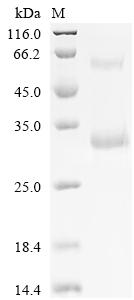Amino acids 1-232 constitute the expression domain of recombinant Human IFI30. This IFI30 protein is theoretically predicted to have a molecular weight of 27.4 kDa. This IFI30 recombinant protein is manufactured in mammalian cell. The IFI30 coding gene included the C-terminal 10xHis tag, which simplifies the detection and purification processes of the recombinant IFI30 protein in following stages of expression and purification.
Gamma-interferon-inducible lysosomal thiol reductase (IFI30) plays a crucial role in antigen processing within lysosomal compartments. It is induced by gamma-interferon and is primarily expressed in antigen-presenting cells, such as dendritic cells, macrophages, and B cells. IFI30 contributes to the degradation of protein antigens by reducing disulfide bonds, thereby facilitating their unfolding and subsequent processing for presentation on major histocompatibility complex class II (MHC-II) molecules. This process is vital for the activation of CD4
+ T cells and the adaptive immune response. IFI30's involvement in antigen processing highlights its significance in immune surveillance and the body's defense against infections and diseases.






